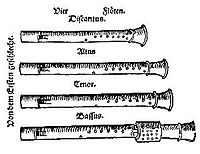
Photo from wikipedia
In this study, we performed a first assessment of the construct validity of a theory and measure of love for music students’ musical instruments. In all, 288 undergraduates at a… Click to show full abstract
In this study, we performed a first assessment of the construct validity of a theory and measure of love for music students’ musical instruments. In all, 288 undergraduates at a large and selective Northeastern university in the United States completed measures of their love of their musical instrument with respect to intimacy, passion, and commitment, the three components of a triangular theory of love. They also provided information about their affective, motivational, and behavioral outcomes with regard to their instrument. The components of the theory of love significantly predicted all affective, motivational, and behavioral outcomes. Moreover, each component of the theory could be measured in a way that showed high internal-consistency reliability. However, the scales of intimacy, passion, and commitment showed less discriminant validity with respect to each other than we ideally would have hoped for.
Journal Title: Psychology of Music
Year Published: 2022
Link to full text (if available)
Share on Social Media: Sign Up to like & get
recommendations!